The Healthiest Fish to Eat According to a Nutritionist in 2026
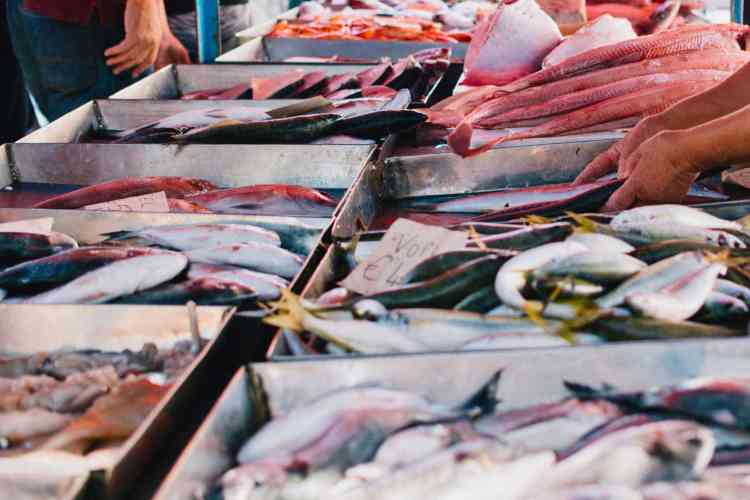
It’s well-known that eating fish provides a multitude of health benefits, but determining the healthiest fish to eat is a little murkier. As soon as you add a hearty helping of salmon to your daily routine, you hear that tuna could be the healthiest fish to eat instead.
Getting ahead of the school to ensure you have the healthiest fish to eat dialed into your diet takes a little learning, but once you know what you’re getting with each type, you can get in the swim and be on your way to balanced nutrition and enhanced well-being.
What’s the trick to figuring out which is the healthiest fish to eat, options that make your shopping and meal prep considerations direct hits every time? What quantity of healthy fish is suitable for your particular needs?
Take a deep dive into this comprehensive directory of the healthiest fish to eat to learn how to balance beneficial fats, rich proteins and essential minerals by placing prime pescatarian picks at the center of your plate.
Jump to Section
How We Choose the Healthiest Fish to Eat
Cozymeal consulted with a nutritionist to ensure this list of the healthiest fish to eat met the most up-to-date criteria set forth by dietary guidelines. Concerns regarding the mercury content in even the healthiest fish to eat served as a guidepost. By applying expert knowledge and careful consideration, this list was compiled to include the best fish to eat based on a favorable all-around nutritional profile.
In addition to our own expertise, we also consulted FDA guidelines regarding mercury content, long-chain omega-3 fatty acids (EPA and DHA), serving recommendations and special considerations for pregnancy and child fish consumption. This helped align our choices for the healthiest fish to eat with the most current advice from an authoritative source.
All nutrition values in this article are sourced from USDA FoodData Central. For any further guidance, readers can view the sources themselves to determine what steps to take when incorporating fish into their diets.
Our choices for the healthiest fish to eat include options that are:
- High in protein
- Rich in omega-3
- Low in mercury content
- Readily available for purchase in fresh, canned or frozen form
- Available in farmed or wild-caught form
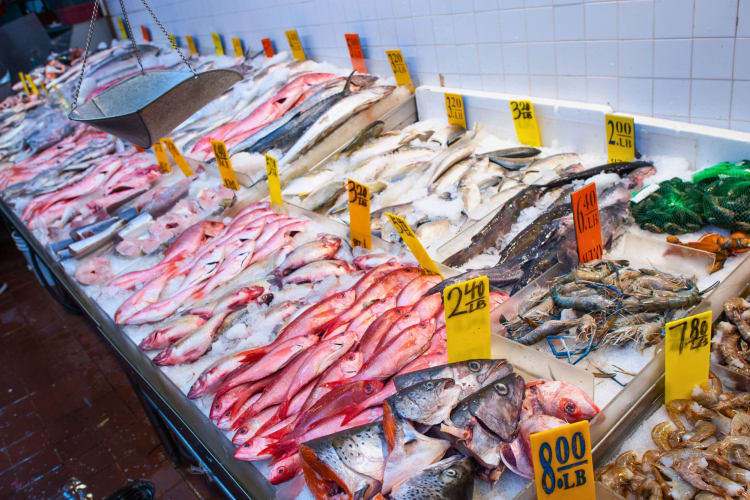
The 16 Healthiest Fish to Buy
1. Salmon
In addition to being one of the healthiest fish to eat, salmon is also one of the most popular picks among fish lovers. Salmon also has a low mercury content, putting it at the top of your options for the healthiest fish to eat.
The robust flavor and tender flake of salmon make it a versatile element for a variety of preparations, everything from poaching to grilling. It’s also available in canned form, making salads and sandwiches easy-to-prepare possibilities for lunches and dinners. And, if you’re wondering, “can you freeze salmon?” the answer is a resounding yes!
Raw Atlantic Salmon Nutritional Info (per 100-gram serving)
- Calories: 203
- Protein: 20.3g
- Total fat: 13.1g
- Saturated fat: 2.28g
- Omega-3s (EPA+DHA): 903mg
- Sodium: 49mg
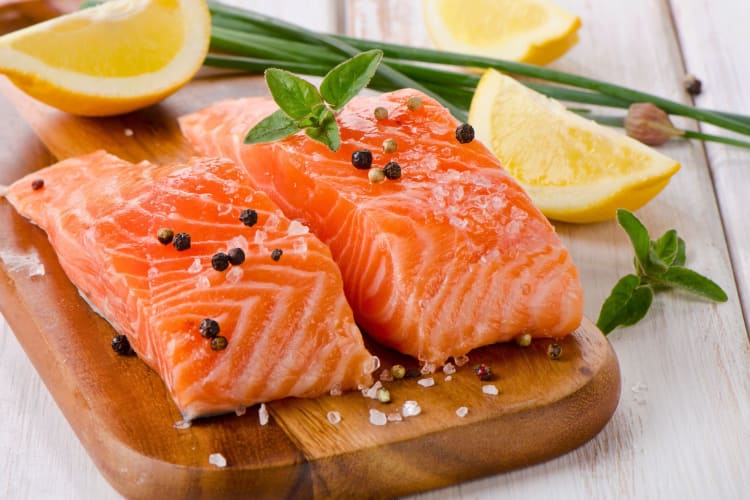
2. Sardines
They may seem like a minor player in the world of fish, but sardines are actually one of the affordable pantry-ready versions of the healthiest fish to eat, putting nutrition within easy reach. Sardines provide vitamin D and, when you eat the soft bones, calcium that supports bone health.
They’re low in mercury and high in omega-3s, making them one of the healthiest fish to eat. For clever methods of getting your weekly share, try working them into pasta dishes, sauces and even on crackers as healthy snacks throughout the day.
Canned Atlantic Sardines in Oil Nutritional Info (per 100-gram serving)
- Calories: 208
- Protein: 24.6g
- Total fat: 11.4g
- Saturated fat: 1.53g
- Omega-3s (EPA+DHA): 982mg
- Sodium: 307mg
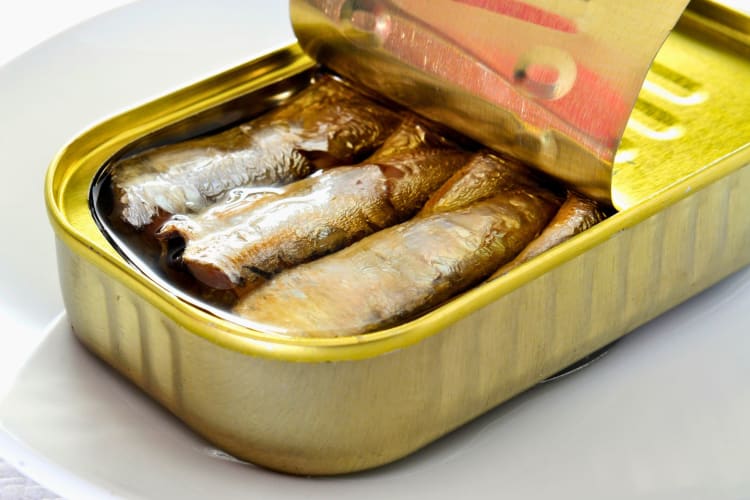
3. Anchovies
If you've only thought of anchovies as a pizza topping or an ingredient in Caesar salad dressing, you've missed out on the opportunity to incorporate one of the healthiest fish to eat into a slew of other recipes. You can even scramble them into eggs for a high protein breakfast with extra nutrients.
Your heart and brain health are well-covered here, thanks to a high quantity of omega-3. And though these small fish present less mercury than other species, they’re relatively high in calories and contain a fair amount of sodium, which means it’s a good idea to enjoy them in moderation.
Canned European Anchovies in Oil Nutritional Info (per 100-gram serving)
- Calories: 210
- Protein: 28.9g
- Total fat: 9.71g
- Saturated fat: 2.2g
- Omega-3s (EPA+DHA): 2053mg
- Sodium: 3670mg
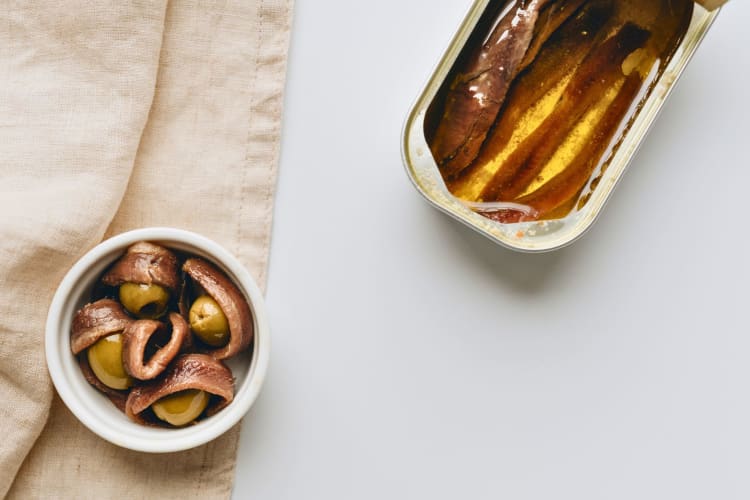
4. Atlantic Mackerel
Atlantic mackerel is one of the healthiest fish to eat on a regular basis, but it can be tricky to find in grocery stores. You may need to try specialty shops or look for frozen fillets or canned options.
The bold, tuna-like flavor appeals to seafood fans, and the low mercury makes it a smart addition a few times a week, delivering omega-3s and vitamin B12. Go for Atlantic mackerel, not king mackerel, which is a high-mercury species.
Raw Atlantic Mackerel Nutritional Info (per 100-gram serving)
- Calories: 205
- Protein: 18.6g
- Total fat: 13.9g
- Saturated fat: 3.26g
- Omega-3s (EPA+DHA): 2,298mg
- Sodium: 90mg
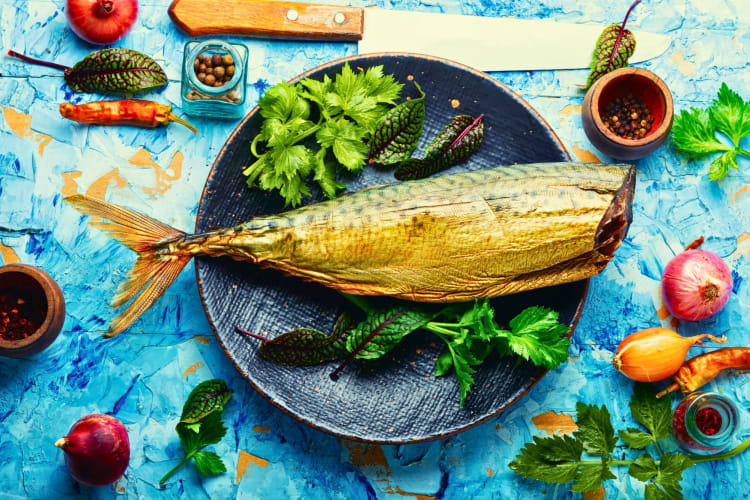
5. Chub Mackerel
Chub mackerel is also known as Pacific mackerel and is a close cousin of Atlantic mackerel. It carries a powerful flavor thanks to the high oil content, a tuna-like essence that can be perceived as either salty or sweet depending on your palate.
It’s a whopper of a catch when it comes to protein, but it also carries a higher calorie count than other candidates for the healthiest fish to eat. Stick to about 4 ounces per meal and pair it with vegetables or whole grains to keep calories in check while getting omega-3s from one of the healthiest fish to eat.
Raw Pacific Mackerel Nutritional Info (per 100-gram serving)
- Calories: 158
- Protein: 20.1g
- Total fat: 7.89g
- Saturated fat: 2.25g
- Omega-3s (EPA+DHA): 1441mg
- Sodium: 86mg
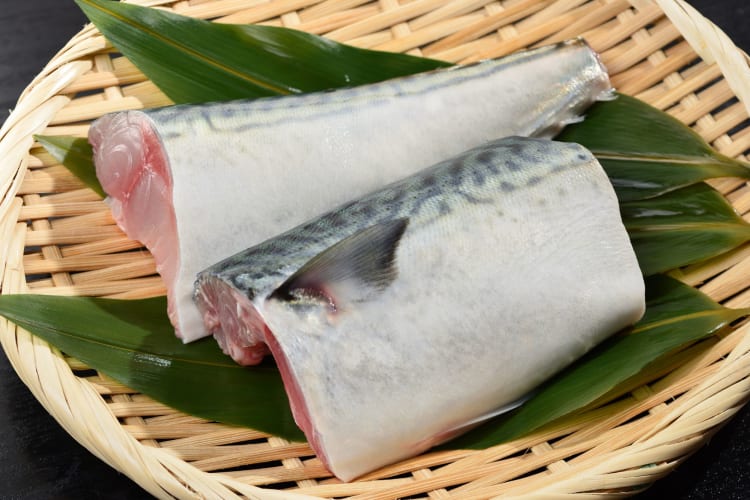
6. Herring
Herring is one of the most common fish selections in Nordic countries, thanks to its bountiful presence and various methods for prep and storage. You can find it in the U.S., particularly on the East Coast, sold in fresh, salt-cured and pickled forms.
It’s a versatile ingredient that offers a variety of ways to work the healthiest fish to eat into your weekly regimen. It also happens to be highly affordable, which is a welcome quality when choosing the healthiest fish to eat, especially if you’ll be enjoying it on a weekly basis.
Raw Atlantic Herring Nutritional Info (per 100-gram serving)
- Calories: 158
- Protein: 18g
- Total fat: 9.04g
- Saturated fat: 2.04g
- Omega-3s (EPA+DHA): 1571mg
- Sodium: 90mg
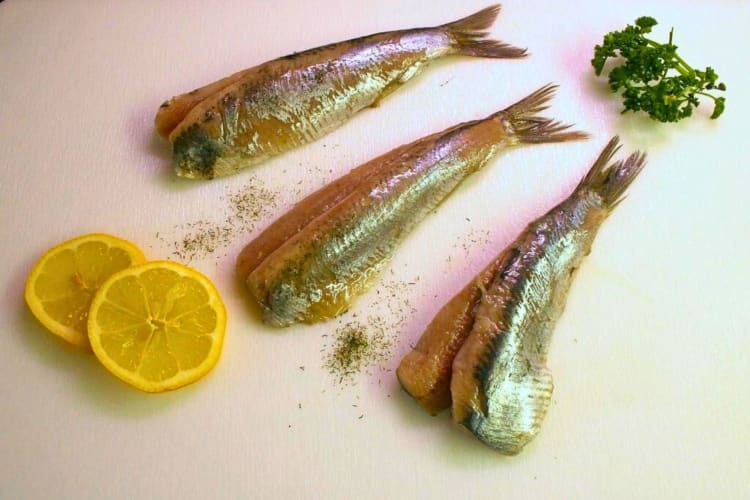
7. Rainbow Trout
If you camp or fish for pleasure, you may already know how plentiful rainbow trout is in North America. It's available in lakes and rivers found largely on the West Coast and in the Mountain West states, a highly catchable species that can become the healthiest fish to eat while exploring the beauty of nature.
Rainbow trout provides omega-3s along with vitamin D, vitamin B12 and selenium, plus some magnesium. In the U.S., it’s typically farmed under environmentally responsible practices, which makes it a conscientious choice.
Raw Rainbow Trout Nutritional Info (per 100-gram serving)
- Calories: 141
- Protein: 19.9g
- Total fat: 6.18g
- Saturated fat: 1.38g
- Omega-3s (EPA+DHA): 733mg
- Sodium: 51mg
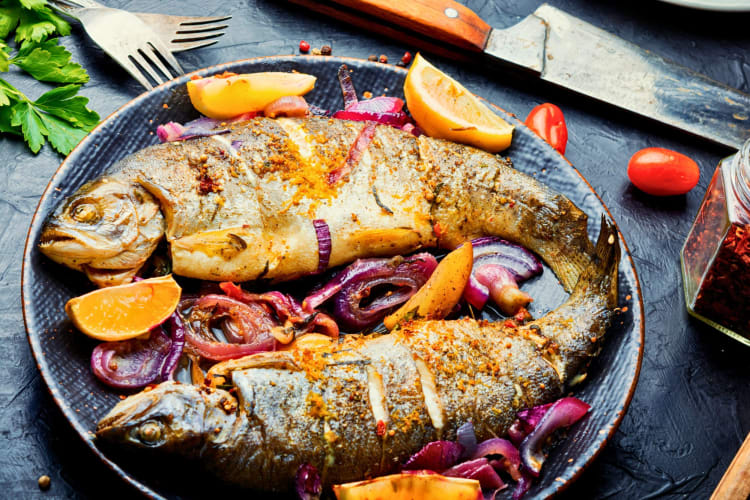
8. Light Tuna
The most easily purchased and ready-to-go candidate in the race for the healthiest fish to eat is light skipjack tuna in water. It’s part of the canned aisle in essentially every U.S. grocery store and a standard sandwich filler and salad topper in the American diet. It’s rich in protein, omega-3 fatty acids and key nutrients like vitamin D and selenium.
It also stretches a food budget, making it one of the healthiest cheap foods. Light tuna contains less mercury than albacore, making it the more optimal choice. While tuna generally has moderate mercury levels, it’s still best enjoyed in limited portions when choosing the healthiest fish to eat throughout the week.
Canned Light Tuna Nutritional Info (per 100-gram serving)
- Calories: 116
- Protein: 25.5g
- Total fat: 0.82g
- Saturated fat: 0.234g
- Omega-3s (EPA+DHA): 270mg
- Sodium: 50mg
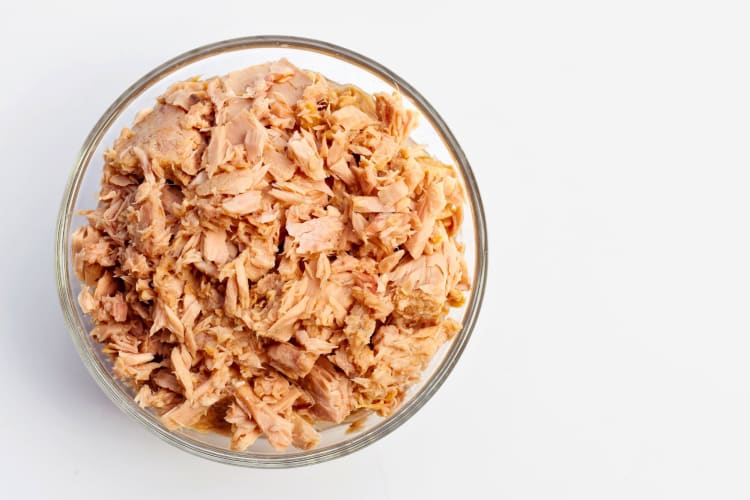
9. Cod
A cold-water fish with plenty of representation in seafood restaurants and steakhouses, cod is a largely North Atlantic species that provides the East Coast with abundant stock of one of the healthiest fish to eat anywhere.
Cod’s mild flavor makes it an easy pick for supper and for air-fried fish and chips. It’s low in calories and fat (thus lower in omega-3s) so you can add vegetables and healthy carbs while staying focused on the healthiest fish to eat.
Raw Atlantic Cod Nutritional Info (per 100-gram serving)
- Calories: 70
- Protein: 16.1g
- Total fat: 0.67g
- Saturated fat: 0.044g
- Omega-3s (EPA+DHA): 72mg
- Sodium: 299mg
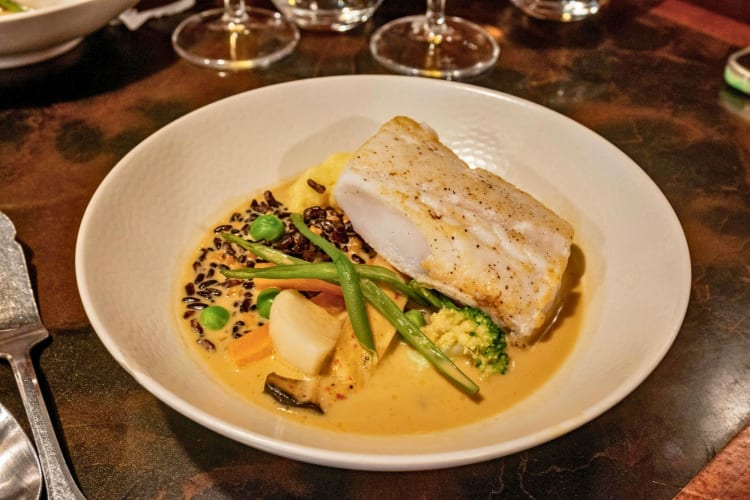
10. Haddock
Beyond being a favorite New England catch, haddock is also a low-calorie, low-fat, high-protein candidate that helps anyone seeking the healthiest fish to keep on the straight and narrow nutritionally. The mild flavor and subtle sweetness are a bonus for those who may be apprehensive about overall taste.
It’s a great fish for smoking and baking and can be incorporated into chowder for a hearty cold-weather dish. As a lean white fish, it’s lower in omega-3s than fattier fish such as salmon.
Raw Haddock Nutritional Info (per 100-gram serving)
- Calories: 74
- Protein: 16.3g
- Total fat: 0.45g
- Saturated fat: 0.093g
- Omega-3s (EPA+DHA): 131mg
- Sodium: 213mg
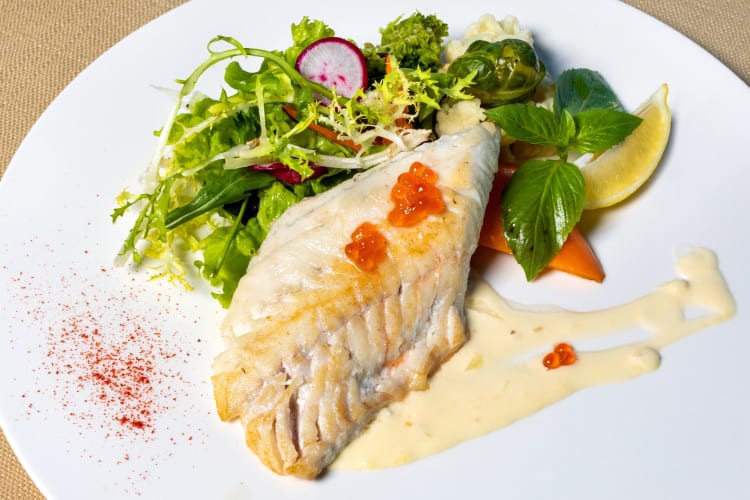
11. Pollock
If you've ever eaten imitation crab meat, you may have been noshing on pollock, North Atlantic and Pacific fish that happens to be a commonly eaten whitefish. This stems from sustainable and efficient fishing methods used by Alaskan pollock fisheries.
The mild taste and flaky texture make it a perfect choice for using in fish tacos as well as for soaking in tangy or savory marinades to add zest and body. Pollock’s combination of low mercury presence, solid protein and mid-range omega-3s makes it a nutritious choice when choosing the healthiest fish to eat.
Raw Pollock Nutritional Info (per 100-gram serving)
- Calories: 56
- Protein: 12.3g
- Total fat: 0.41g
- Saturated fat: 0.128g
- Omega-3s (EPA+DHA): 165mg
- Sodium: 333mg
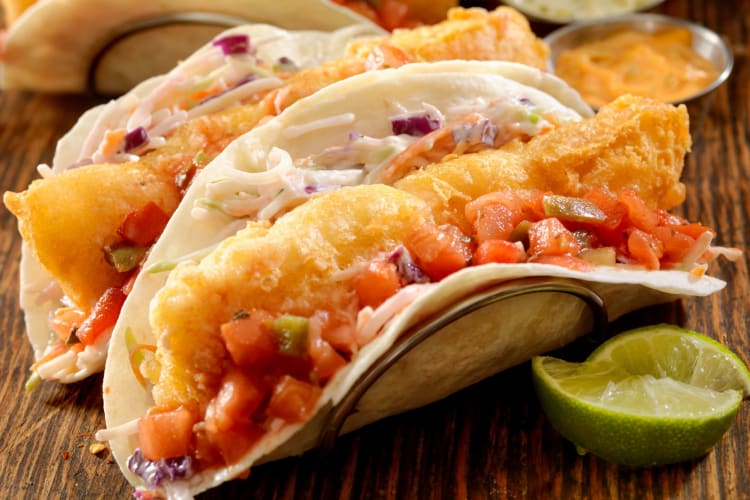
12. Flounder
The delicate sweetness of flounder steers it away from the fishy flavor found in other species, a plus for anyone who may be hoping for a subtle profile. Minimal oil and tender flakiness make flounder an ideal fish for grilling or baking, especially when accented with seasonings and sauces.
Though you can easily pick up frozen flounder in most grocery stores, if you live in an area with fresh fish markets, shop there to experience one of the healthiest fish to eat in an even fresher form.
Raw Flounder Nutritional Info (per 100-gram serving)
- Calories: 70
- Protein: 12.4g
- Total fat: 1.93g
- Saturated fat: 0.441g
- Omega-3s (EPA+DHA): 245mg
- Sodium: 296mg

13. Sole
Mild flavor is a hallmark of sole, though there may be variations based on the location in which the fish are caught. Sole is a low-mercury flatfish that is similar to flounder.
It is low in calories yet high in protein gives sole a personality that makes it a prime catch among the healthiest fish to eat. The leanness of this white fish also means it contains less omega-3s than other oilier species.
Raw Sole Nutritional Info (per 100-gram serving)
- Calories: 70
- Protein: 12.4g
- Total fat: 1.93g
- Saturated fat: 0.441g
- Omega-3s (EPA+DHA): 245mg
- Sodium: 296mg
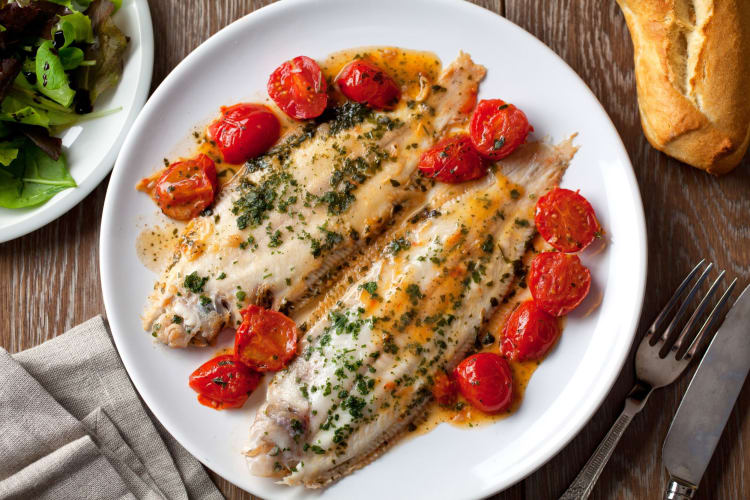
14. Tilapia
Though tilapia originated in the Middle East and Africa, this commonly seen selection is now raised worldwide and easy to find. It’s lean and relatively low in calories with solid protein, plus niacin and potassium.
It’s lower in omega-3s than oily picks like salmon or sardines, so include it in a rotation of the healthiest fish to eat for variety. Though frozen tilapia may be available in your grocery store freezer section, you may want to check the seafood counter to see if you can taste the fresh version.
Raw Tilapia Nutritional Info (per 100-gram serving)
- Calories: 100
- Protein: 19g
- Total fat: 2.48g
- Saturated fat: 0.647g
- Omega-3s (EPA+DHA): 28mg
- Sodium: 94mg
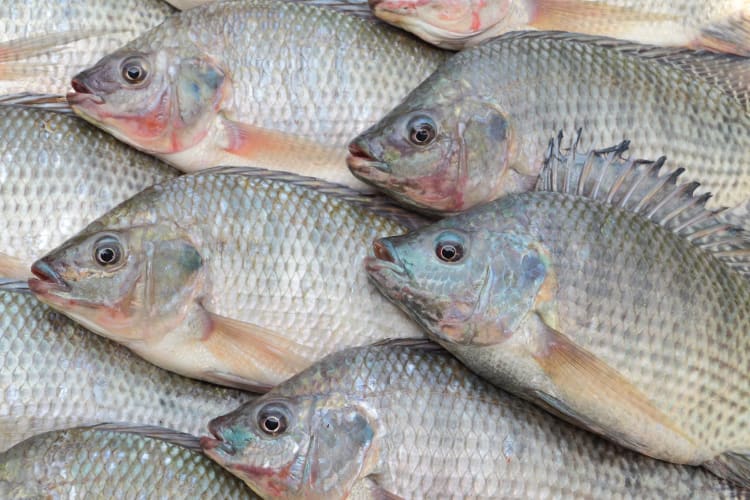
15. Hake/Whiting
As part of the cod family, hake (also sold as Pacific whiting or silver hake in the U.S.) shares the hallmark flakiness and white-hued flesh of its fellow specimens. It’s lean and low in calories, but is lower in omega-3s than oily picks.
Try pan-searing or poaching to make the most of your efforts to work the healthiest fish to eat into your diet in a range of formats that keep your options varied and enticing. You can easily find whiting year-round in big-box retailers and warehouse stores, putting the healthiest fish to eat well within reach no matter where you shop.
Raw Whiting Nutritional Info (per 100-gram serving)
- Calories: 90
- Protein: 18.3g
- Total fat: 1.31g
- Saturated fat: 0.247g
- Omega-3s (EPA+DHA): 224mg
- Sodium: 72mg
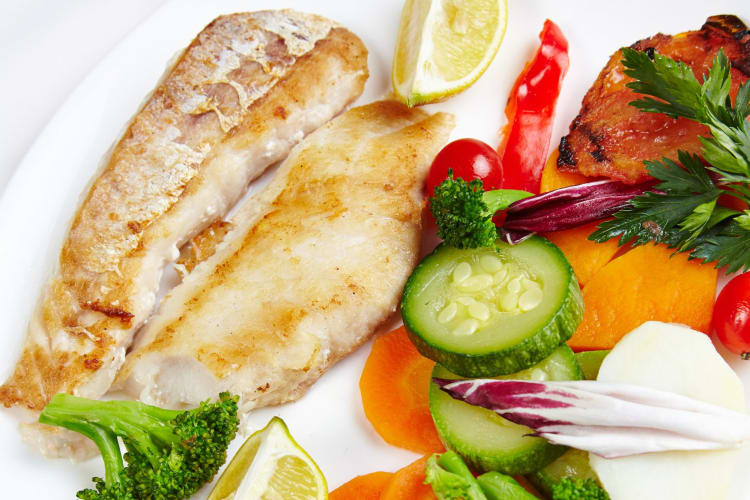
16. Sablefish
Silky and rich, sablefish (also known as black cod) holds a buttery texture that stays tender whether you roast, broil or miso-glaze it. Naturally high in omega-3s and generally low in mercury, it made the list of the healthiest fish to eat.
If you’re building a weekly mix of healthy fish, pair sablefish with lean picks like hake for balance. Look for U.S.-caught sablefish from well-managed fisheries, or check specialty fishmongers, Japanese grocery seafood counters and reputable online seafood markets that ship flash-frozen fillets.
Raw Sablefish Nutritional Info (per 100-gram serving)
- Calories: 195
- Protein: 13.4g
- Total fat: 15.3g
- Saturated fat: 3.2g
- Omega-3s (EPA+DHA): 1,395mg
- Sodium: 56mg
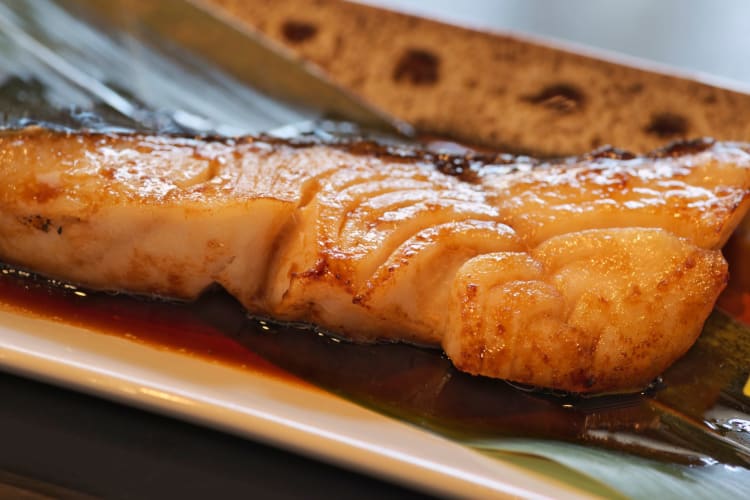
Is Fish Healthy?
By its nature, fish is one of the most nutrient-dense animal-based foods you can eat. This makes figuring out how to work fish into your diet one of the most effective steps in learning how to start eating healthy.
White fish are lean, low-calorie sources of complete protein with useful micronutrients like B12, selenium, iodine and phosphorus. Oily fish are an excellent source of omega-3 fatty acids, which support heart health and brain function in adults and are important for brain development in children.
To get the maximum benefit provided by adding the healthiest fish to eat to your diet, try eating fish-based meals two or three times a week that feature an adult-sized 4-ounce portion. Opting for cleaner cooking techniques like grilling, baking or steaming rather than frying will help you avoid adding extra fat and calories.
As price can often be a barrier to taking advantage of the healthiest fish to eat, working in canned fish or frozen fillets for more cost-effective, nutrient-dense options can help you reap the benefits without breaking your budget. When you can, include an oily fish for omega-3s and choose lower-mercury species for routine meals.

What Is the Healthiest Fish?
The healthiest fish to eat are low in mercury, rich in protein and high in omega-3s. Top picks from this list include salmon, sardines, anchovies, herring, Atlantic mackerel, rainbow trout and sablefish all deliver meaningful omega-3s with solid protein.
If you prefer a leaner plate, cod, haddock, pollock, flounder and hake are some of the healthiest fish to eat that are low in mercury and calories. Just note that these white fish are lower in omega-3s than the oily options above.
It's crucial to check labels when shopping for the healthiest fish to ensure that your purchase is of high quality. You’ll find healthy options among label-certified MSC (Marine Stewardship Council) for sustainable wild-caught fisheries or ASC (Aquaculture Stewardship Council) and BAP (Best Aquaculture Practices) for fish farms that maintain environmentally and socially responsible practices. For the safest consumption of even the healthiest fish on the market, pregnant individuals and children should always avoid species known to be high in mercury.
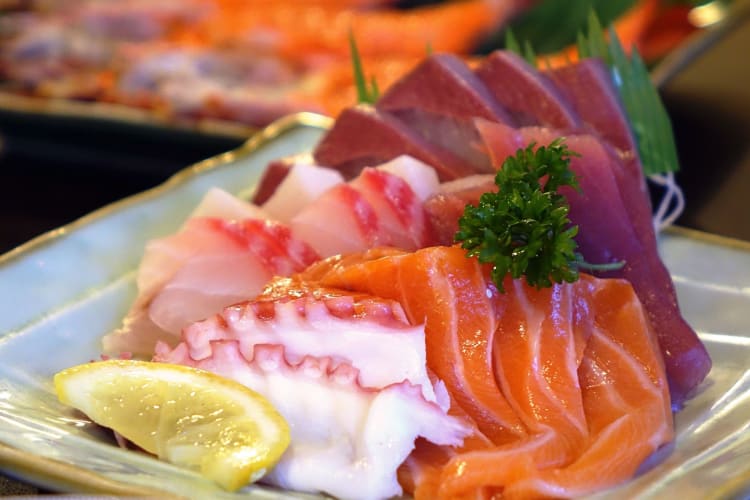
Knowing all about the healthiest fish to eat won’t work if you don’t enjoy what you’re eating. The best way to augment your diet with the best fish is to work in a few different types throughout the week.
Once you have an idea of your favorites among the healthiest fish to eat on a regular basis, experiment with recipes that keep additional salt and fat to a minimum while ramping up flavor and excitement. It may take a little trial and error, but with a bit of effort, you’ll catch onto the healthy fish movement in no time.
For even more ways to explore your favorite foods, check out other experiences happening on Cozymeal.
